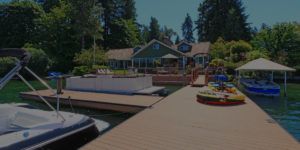YEAR-ROUND CASH FLOW FOR SEASONAL SALES
Nick and Julie Newman know a thing or two about factoring. Since establishing Ridgeline Manufacturing in 2008, the manufacturers of aluminum recreational products recruited the services of three separate factoring companies, with disappointing results. That is, until they met Liquid Capital.
Having launched just before the financial crisis hit, Ridgeline encountered its fair share of financial challenges. Those first few years were tough—and given the company’s specialization in summer recreational equipment, the winters were particularly difficult. Nick and Julie tried a number of measures to increase their off-season cash flow—including introducing a line of ice fishing houses.
Despite this, off-season cash flow remained limited. Recognizing you can’t grow a business by laying off your workforce and closing your facilities for half a year, Nick and Julie decided that they’d have to find a way to keep their employees busy in the winter—and that meant trying to convince their dealers to order boat docks, the company’s bread-and-butter product line, early.
“Our thinking was, when the customers come in to get the docks in the spring, the dealers could have the materials available,” Nick says. “So we decided to offer 90-day terms to our dealers. The problem was, we couldn’t hold off on paying our employees for 90 days, so we needed financing.”
“WE NEED TO MANUFACTURE AND PRODUCE THE PRODUCT PRIOR TO THE BUYING RETAIL SEASON, AND THAT MEANS GIVING OUR RETAIL DEALERS ENOUGH TIME TO GET THE PRODUCT IN AND PREPARE IT. SO WE NEEDED A FINANCING SOLUTION TO ALLOW US TO EXTEND OUR TERMS.”
Nick Newman, Co-Owner, Ridgeline Manufacturing
IN SEARCH OF A BETTER FACTORING EXPERIENCE

Despite the fact that the company’s original business loans were 60% paid off, Ridgeline had a difficult time getting traditional financing because the building, along with the manufacturer’s tangible assets, were only worth 40% of their original price tags. After a few declined applications, it decided to give factoring a chance—but was turned off by the experience.
“With one factor, I was set up with a $250,000 line of credit—but if it had been established, it would have gone to $600,000,” Nick explains. “I had to guarantee $450,000 would be financed each month, and I was paying interest on that $450,000 even if I wasn’t using the funds.”
Nick didn’t like the lack of flexibility within most factoring contracts, or the fact that he had to read each one with a fine-toothed comb.
“These factoring companies were out to charge high interest rates and then double them up whenever possible. They thrived off of short-term customers, not long-term relationships.”
Tired of playing the factoring game, Nick went back to the bank to see if enough time had passed for Ridgeline to qualify for a refinance. It didn’t—but the banker convinced him to give factoring one last shot. He reluctantly took the banker’s advice and contacted Liquid Capital.
A FLEXIBLE APPROACH
After his initial conversation, Nick was intrigued. He liked the idea that, with Liquid Capital, there were no minimums—and no penalties for factoring one day and not the next. He also appreciated that Liquid Capital didn’t charge interest on money already collected.
“With a lot of factoring companies, they charge full interest whether we use the money full-term or not. But at Liquid Capital, if a dealer sells $200,000 worth of product, they can pay net-30, but if they pay within 15 days, you don’t pay interest on the money already collected — you’re only charged for the money you use.” Another huge differentiator was Ridgeline’s dedicated Liquid Capital representative.
“With a lot of other companies, you go through tons of different people—even just to get an approval. After you’re approved, you still don’t have a dedicated contact. At Liquid Capital, I know who I’m dealing with—and I know he’s looking out for my best interests, and trying to save us money whenever possible.”
“OUR LIQUID CAPITAL REPRESENTATIVE IS MORE THAN A LENDER—HE’S A BUILT-IN CONSULTANT.”
Nick Newman, Co-Owner, Ridgeline Manufacturing
FACTORING IN THE FUTURE
Right now, Nick and Julie still build to order, so they primarily use factoring to pay for associated operating costs. Typically, the company uses the services of 50 vendors to complete one product line—and not all of those vendors offer payment terms. Those that do usually offer 30 days, but Ridgeline can’t build a product in that time span, so factoring is used to fill in the gaps.
The company also appreciates that, because Liquid Capital purchases the receivables outright, it also takes care of collections.
“When manufacturers advance funds to their customers, there is often push-back on us charging interest,” says Nick. “But with Liquid Capital doing that, it’s different. As a third party, it’s more palatable to our dealers and helps the collections process too.”
All in all, factoring has provided Ridgeline Manufacturing with increased flexibility—and that’s allowed the company to land three new dealers. Plus, this is only the beginning.
“Ultimately, I’d like to replace all my lower-profit lines with marine products. To do that, I need the ability to manufacture and build roughly three months in advance—which means I’d need a solution to pay my vendors off in 30 days, when I won’t see a return on that for a minimum of 90 days,” Nick says. “So I’d like to eventually have an operating line, which I don’t qualify for yet. But, judging by the way things are going, I anticipate we’ll get there very soon.”
“SURE, FACTORING IS HIGHER INTEREST, BUT WE BUILD IT INTO THE COST OF OUR PRODUCT AND IT’S SEASONAL. SO IF I PAY MORE THAN I WOULD WITH A BANK, BUT CAN FACTOR FOR JUST A FEW MONTHS A YEAR, THAT’S A BIG BONUS.”
Nick Newman, Co-Owner, Ridgeline Manufacturing





